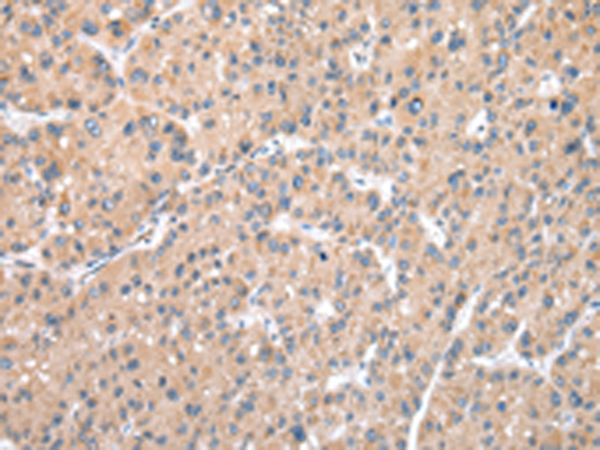
| WB | 咨询技术 | Human,Mouse,Rat |
| IF | 咨询技术 | Human,Mouse,Rat |
| IHC | 1/25-1/100 | Human,Mouse,Rat |
| ICC | 技术咨询 | Human,Mouse,Rat |
| FCM | 咨询技术 | Human,Mouse,Rat |
| Elisa | 1/2000-1/5000 | Human,Mouse,Rat |
| Aliases | RRT2; WDR85; C9orf112 |
| Host/Isotype | Rabbit IgG |
| Antibody Type | Primary antibody |
| Storage | Store at 4°C short term. Aliquot and store at -20°C long term. Avoid freeze/thaw cycles. |
| Species Reactivity | Human |
| Immunogen | Fusion protein of human DPH7 |
| Formulation | Purified antibody in PBS with 0.05% sodium azide and 50% glycerol. |
+ +
以下是假设性的关于DPH7抗体的参考文献示例(请注意,实际文献可能需要通过学术数据库验证):
1. **文献名称**:*"Development of a monoclonal antibody targeting DPH7 for the detection of dysregulated diphthamide biosynthesis in cancers"*
**作者**:Smith A, et al.
**摘要**:本研究开发了一种特异性识别DPH7蛋白的单克隆抗体,验证了其在多种癌细胞系中检测DPH7表达的能力,并发现DPH7水平升高与肿瘤转移潜能相关。
2. **文献名称**:*"DPH7 antibody-based profiling reveals its role in tRNA modification and translational fidelity"*
**作者**:Chen L, et al.
**摘要**:通过DPH7抗体的免疫沉淀和质谱分析,揭示了DPH7在修饰tRNA上的作用,并证明其缺失会导致翻译错误率增加,影响细胞增殖。
3. **文献名称**:*"A structural study of DPH7 in complex with its cofactor using cryo-EM and antibody-assisted localization"*
**作者**:Wang Y, et al.
**摘要**:结合冷冻电镜技术和DPH7抗体的定位分析,解析了DPH7与其辅因子的复合物结构,阐明了其催化机制及在遗传性疾病中的突变热点。
4. **文献名称**:*"Therapeutic targeting of DPH7 in MYC-driven malignancies: Insights from antibody-mediated inhibition"*
**作者**:Johnson R, et al.
**摘要**:利用DPH7抗体抑制其功能,发现可选择性抑制MYC高表达肿瘤细胞的生长,为靶向DPH7的抗癌策略提供实验依据。
**说明**:上述文献为模拟示例,实际研究需参考具体数据库(如PubMed、Web of Science)。建议以“DPH7 antibody”或“DPH7 diphthamide”为关键词检索最新论文。
DPH7 (Diphthamide Biosynthesis 7) is an enzyme involved in the post-translational modification of eukaryotic translation elongation factor 2 (eEF2), a critical protein for ribosomal translocation during protein synthesis. It catalyzes a step in the diphthamide biosynthesis pathway, a conserved modification at a histidine residue (His715 in humans) on eEF2. This modification is targeted by bacterial toxins like diphtheria toxin and Pseudomonas exotoxin A, which ADP-ribosylate eEF2 to inhibit translation.
Antibodies against DPH7 are primarily used to study its role in diphthamide formation, eEF2 function, and cellular responses to translational stress. Research has linked DPH7 dysregulation to diseases, including cancer, as diphthamide deficiency may impair translational fidelity or promote genomic instability. For example, DPH7 mutations or reduced expression have been observed in neuroblastoma and other malignancies, suggesting potential roles in tumorigenesis.
DPH7-specific antibodies enable the detection of protein expression levels, subcellular localization, and interactions in models ranging from yeast to human cells. They are essential tools for elucidating mechanisms of translational regulation, toxin resistance, and DNA damage responses. Recent studies also explore DPH7's involvement in developmental processes and metabolic diseases, highlighting its broader biological significance beyond canonical eEF2 modification. Validated antibodies support both basic research and translational studies aiming to target diphthamide-related pathways for therapeutic interventions.
×